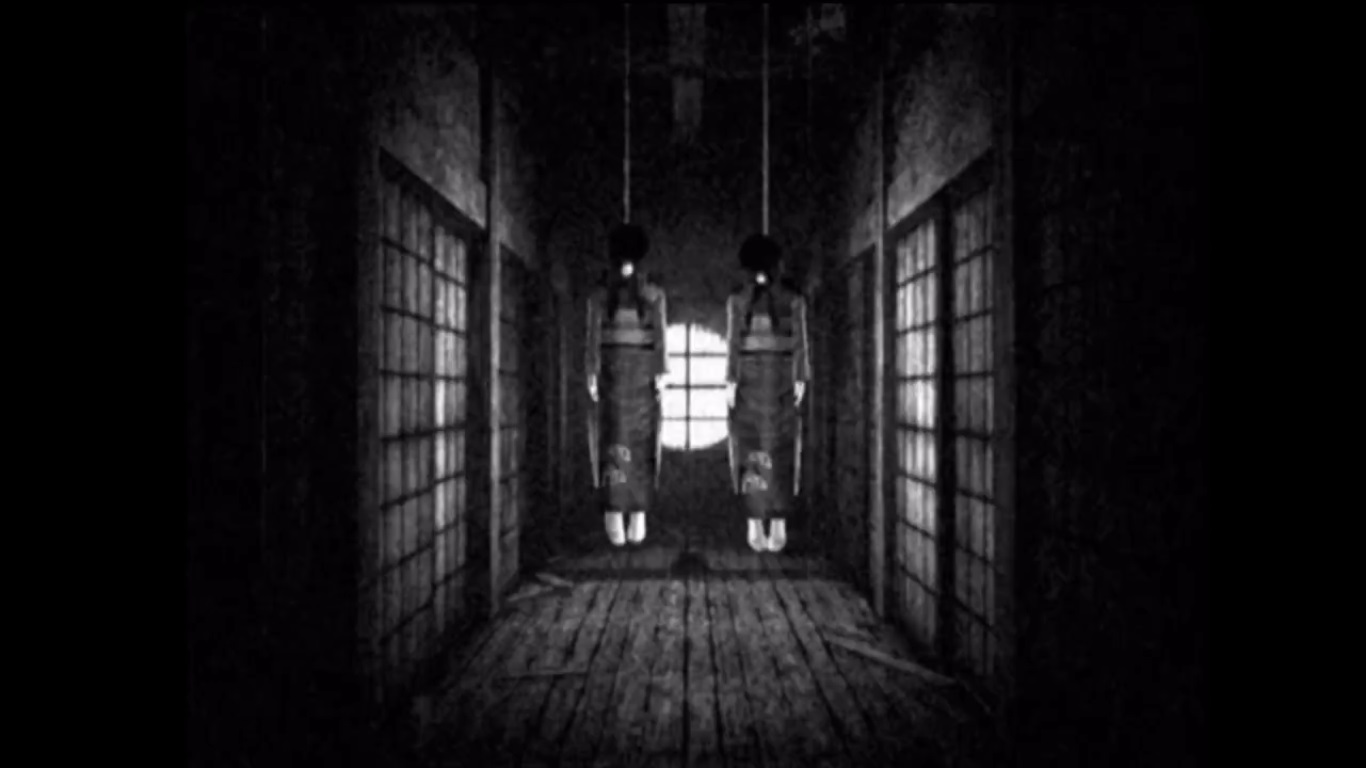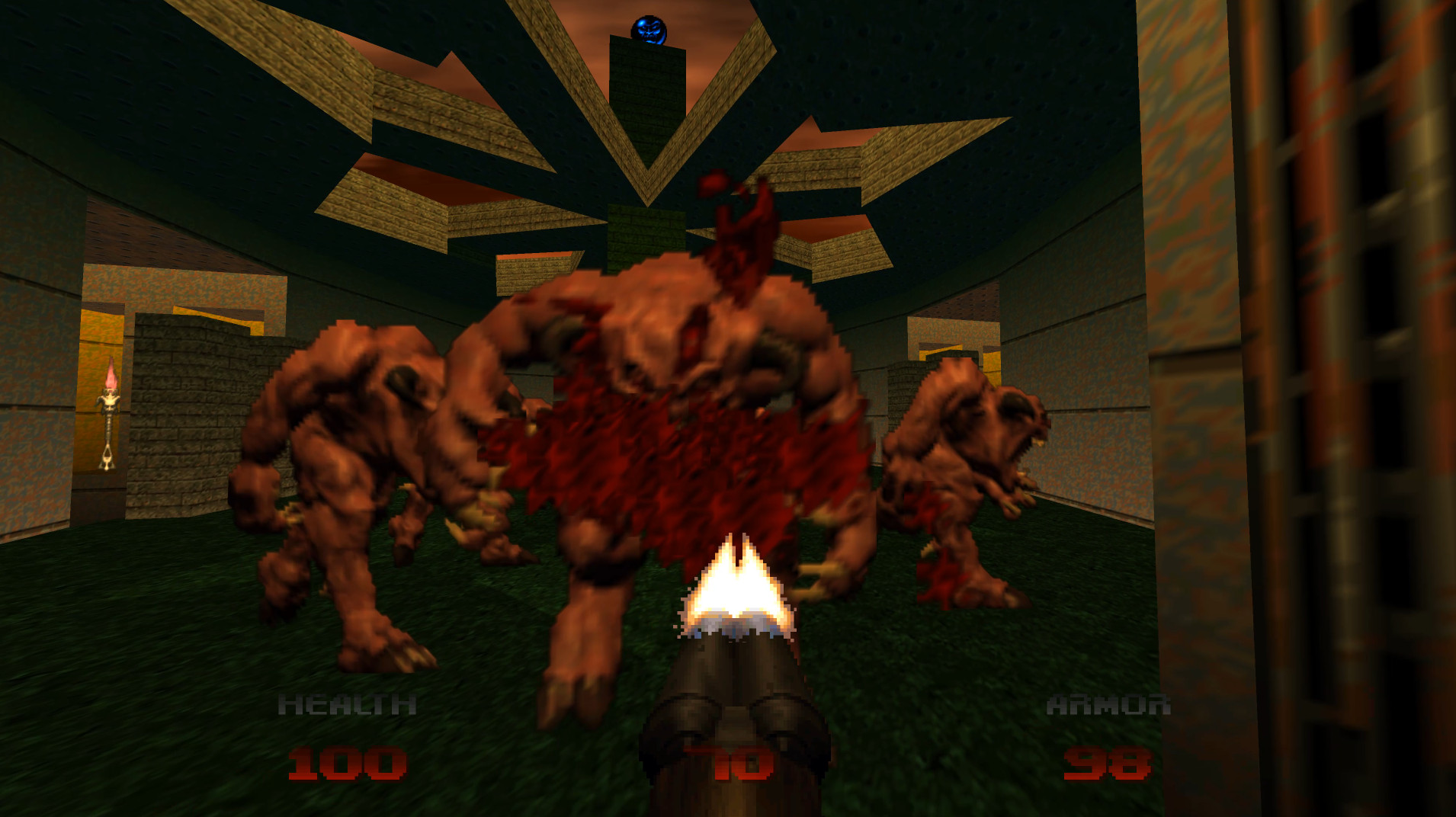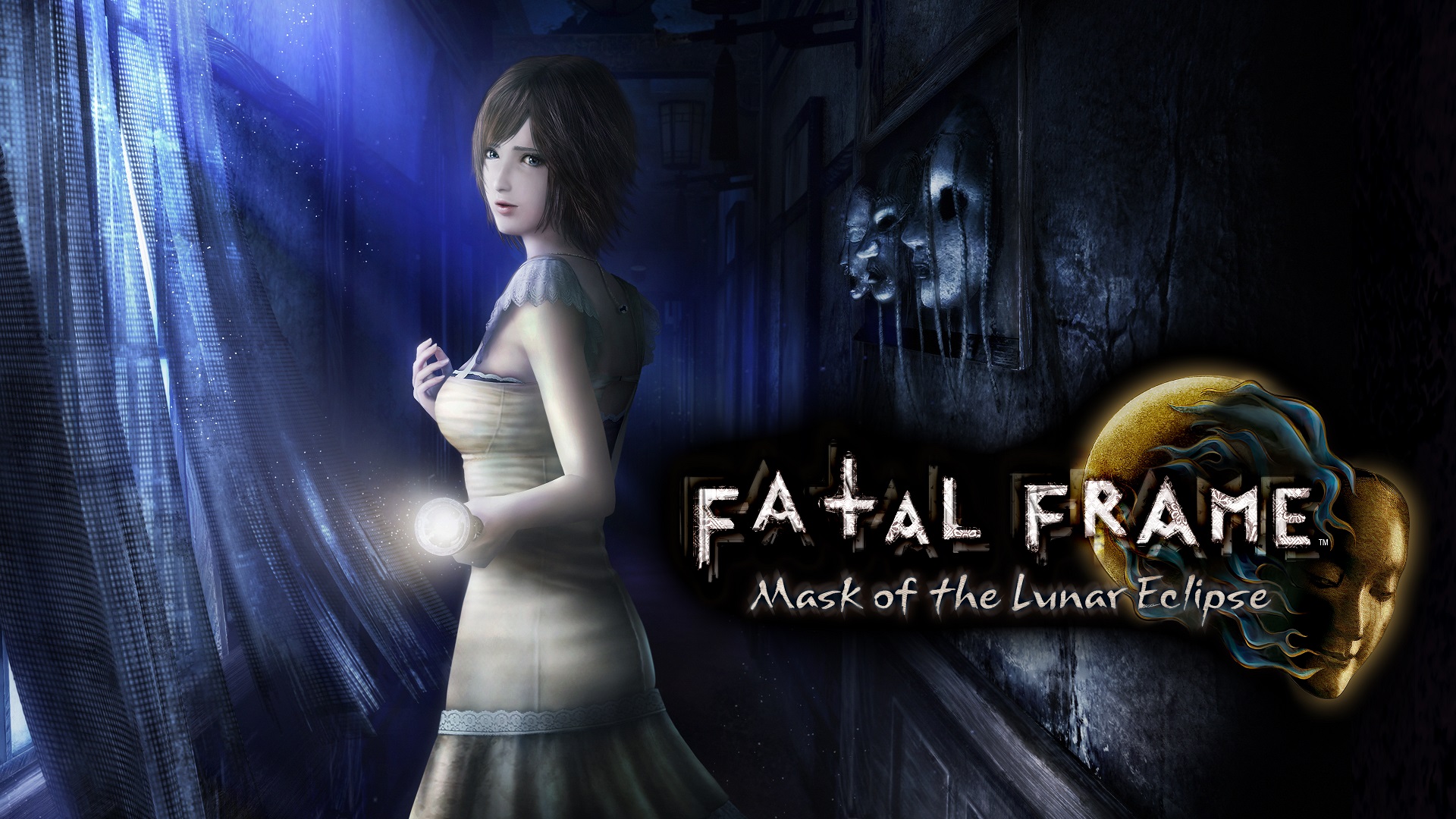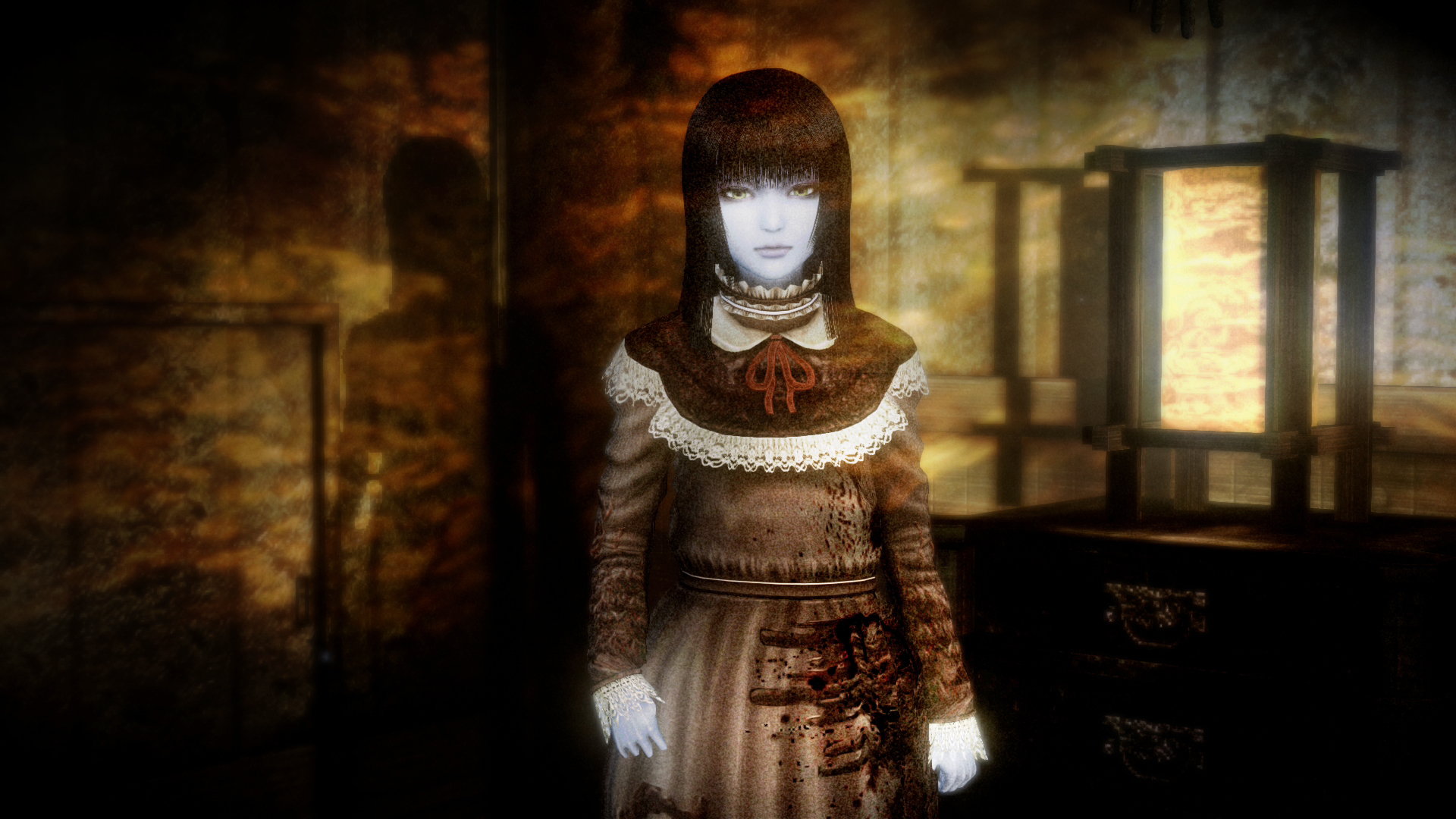
Dissonant Voices – The Unsettling Sounds of Fatal Frame II
I don’t believe in ghosts. But the sounds I hear in the dark – the stuff that stirs the dog from a dead sleep and leaves him staring into the void at my door – make me doubt.
That’s the truth of it, isn’t it? We can usually dismiss the ghosts and ghouls of horror as harmless fiction. Nothing supernatural is waiting in the hall to scare me to death. Nothing is creeping behind me on the stairs when I’m coming up from doing laundry in the basement at night. Nothing is peering back at me in the shadowy mirror during that 2am bathroom run. It’s the creak coming from the floorboards that makes me doubt, though. The errant thump somewhere in the murk. It’s the audio hint that something seemingly inexplicable has happened that causes my brain to discard all logic and assume that I’ve always been wrong to dismiss the restless phantoms of the dead.
Fatal Frame II is a staggeringly good horror game (and you should definitely play it since no new entries in the series seem to be coming any time soon), offering dreadful hauntings, a compelling weapon in the form of a camera that can harm ghosts, and a story that drags you deeper into a spiritual, yet all-too-human cruelty that forms the backbone of the game’s events. For pure, heart-wrenching horror, few games can match it. For all of its scarring depictions of spectral dead and frightening events, it’s the game’s sound design – that thing that shreds reason and draws you back to a primal dread – that makes it an unforgettable entry in horror games. And maybe something that can get a little too real in places.
Fatal Frame II excels at both a creeping, slow-boil dread and a jarring bolt of fear that hits like a hammer, and its audio design draws from both kinds of fear to continually unsettle the player. For the former, the game makes frequent use of near-silence. Often, as you make your way through the game, the only the sounds you’ll hear will be your feet creaking against floorboards or crunching in the dirt.

This conscious lack of sound has several effects on the player. When there’s no sound besides that of your footfalls, you become highly aware of anything else you might hear. It’s the same principle as the creaking stairs in my own home and how it makes me feel unsafe in the middle of the night. There’s nothing else to listen to, and no movement anywhere nearby that you know about. So, you can’t help but hear every little thing and give it meaning in your head. If you’re alone, your footsteps should be all you should hear, right? So, what’s the sound coming to you on the breeze?
Secondly, the silence makes you painfully aware of how alone you are. If the only sound in the world is coming from your actions, you know that you are the only person who can save yourself. There’s no bustle of people nearby. No sounds of cars driving by outside. No general murmur of your family or friends around you. Silence requires solitude, and in Fatal Frame II, that means there is no one coming to save you when you DO hear something creeping along behind you, or something murmurs in the dark ahead of you.
This quiet creates a space within the player’s head for their imagination to start going wild. Is it only my footsteps I’m hearing? Is that sound simply the wind, because it almost sounded like a voice? Is something staring back at me, unmoving, inside of the soundless void? And how will I face it all on my own? Getting the player involved in scaring themselves is what makes an atmosphere work well, which Fatal Frame II does to grand effect even without any ghosts around.
Silence by itself isn’t enough to frighten, which is why Fatal Frame II makes great use of sound effects. The simple sound of your own feet is effective in making this silence a little creepier, after all. Those creaking floors, or the rocks that crunch underfoot, would give your position away to anything that was following you, wouldn’t they? There’s this sense that you can’t hide due to all of the noise you’re making, even if it’s fairly quiet.

The game further enhances the sound with some very selective music. The first house you enter in the game has the barest sound of wind moving through it, occasionally punctuated by this short tone that definitely sounds like something moaning. It’s this lamenting cry that you can tell is meant to be music, but doesn’t a part of you doubt that just a little bit? Doesn’t it seem like the house itself is howling at your presence, reality giving way to a place where the suffering dead roam.
It’s also unsettling that this tune is so inconsistent. You get long periods of near-silence, followed by this ghoulish, yet striking, moan that plays. It leaves you with this emptiness that’s so vast that you can forget the game is even playing music, and then it comes back, seeming to hint that something is creeping from the walls along with it. On top of this, video games rarely play music for no reason, tending to hint at some change in the play space with a shift in audio, so you can’t help but wonder what’s new in the game world when you hear this howl.
Footsteps and music play with subtlety, but the game can be outright jarring with some of its door effects. Going into another room often requires opening these extremely loud locks, shoving through doors that slam shut with a deafening crash in the near-silence. Like I said, when this place is so quiet, it feels like making a loud sound is going to draw something’s attention. And you’re often forced to be loud with each door you come through (even the sliding doors make a lot of noise), which often had me feeling that something was going to notice me, and soon.
It’s just Fatal Frame II continuing to toy with you and make you wonder what’s creeping up behind you, though. It’s about using sound to make you wonder and create imagined horrors in your mind. Those ghosts are coming, aren’t they?
And then, just like that, something is right there, walking along beside you. Or staring at you from down a hall. Something gray and lifeless peering at you from the corner of a room.

Fatal Frame II does all sorts of things with its sound when a ghost happens upon you. First, a heartbeat begins to play. It’s a noise that, while soft, is jarring no matter how many times I’ve heard it. My own heart always leaps in my throat at the muffled pounding of that unsettling organ. I often wonder if it’s supposed to be your own heartbeat or that of the ghosts? Is it your fear wrapping around you with this loud sound, or some gruesome way of showing that something unnatural is clinging to life so hard that its heartbeat is filling the air around it. Both ideas create discomfort, but the sound itself is soft, nestling in the back of your mind and making room for the game’s further audio quirks.
Ghosts also tend to be accompanied by voices both clear and distorted, whispering things long lost to time. It’s a neat way of providing the player with background narrative while keeping things scary (ghosts muttering stuff they said before they died is just spooky on its own, all right?), and it also reminds us of the humanity of these dead things that are chasing us.
Ghosts are especially frightening due to how close they skew to reality. I’m not saying I suddenly think ghosts are real, but ghosts come from traumatic events and deaths in a great deal of folklore, and that’s definitely their source in Fatal Frame II. While some of these events are supernatural in origin, a lot of these ghosts have been scarred and killed through human cruelty. Cruelty in the service of religious ritual, sure, but many of these ghosts died from violent human actions that you could easily see happening in the real world. The effects in this world are the stuff of fiction, but the deaths are very much within the realm of real human viciousness. This stuff could happen to you.

So, when some phantom thing keeps calling out for a lost loved one while grasping your throat, it’s unsettling because it’s a ghost, but doubly in that this could happen to you for real. These sad and enraged cries, these echoes of voices in the past, all act to remind you that these used to be people, and that often, other people did terrible things to them to make them this way. It loans events that little touch of reality that let them creep that much closer to your own existence.
When the audio is crackling, muffled, or distorted, it plays with something else entirely on top of it all.
It sounds like something captured through old audio tech – a recording made years and years ago. Old audio tech makes a lot of sense within Fatal Frame II’s fiction, given the ancient camera that’s the focal point of how you play the game. Old photography, film, radio, and audio capture are all massive parts of how these games work.
What’s so scary about old audio recordings, though? Well, how many people are still alive in those old, crackling recordings these days? In the era of clear, crisp audio, to hear the hissing and pop within an old recording is to, quite literally, be listening to the voices of the deceased. Many of the people in these aging recordings have long passed, a fact that always tickles the back of my mind when I catch an old song playing in a documentary or fuzzy footage I’m playing for research. These are the echoes of someone long gone.
And the other reasons for muffled sound? Listening in on someone you shouldn’t be? Secrets that aren’t yours to know? And what of the simple fact that hearing something distorted can mean the mind isn’t quite right? That reality isn’t quite what we think it is, or that we’re lost in a dream world somewhere. The game whispers to you with these ghostly voices, but it’s also screaming that these are voices that aren’t meant for your ears, that these are secrets not meant for you to know, and that it is the dead who are mouthing them from right behind your shoulder.

These voice clips tend to layer over one another, creating a chaotic chatter as you face down a spirit. Several voices may speak at once, with crackling voices and clear cries mixing together (along with the occasional unnatural, frightening laugh for good measure), creating this inability to focus within the player, while also ramping up the emotional intensity of the moment. There’s so many emotions and fearful things and cries for help within these encounters at times, all of which keeps the player disoriented and confused as they struggle to snap a photo.
Oh yeah, and it’s also just scary to encounter something with a broken neck that keeps saying “It hurts.” Or a child ghosts whispering “Kill,” over and over again. Sometimes you don’t have to be super clever to be frightening.
It gets worse when you’re fighting the ghosts, as all of this audio horror swirls together to try to overwhelm you. It’s voices crying out from the past, broken and crackling, and clear sounds of rage and sorrow. It’s that heartbeat (that hideous heart) telling you the ghosts are getting closer. It’s all of this maddening sound swirling together as you struggle to aim your camera at something that can come rushing out from a wall too fast for you to react.
It’s also the hum of discordant music filled with droning notes, which Fatal Frame II makes powerful use of in combat. The music that plays when you’re battling ghosts uses long notes that seem to whittle at the mind, buzzing in your ears as you watch these unsettling things float toward you. It’s a kind of pressure, like the ghost’s presence is given form through a music that keeps pressing in on you through your ears. The battle music can be like an attack, one that grows louder, more shrill, more manic and more broken as the fight progresses. It creates this sense of being unnatural, and it’s an actual relief when you defeat the ghost and silence returns.
This effect is further compounded by the effects of the Camera Obscura. The harsh clicks of taking a picture. The sizzle and hiss of snapping an effective shot. Its sounds loan it this feeling of weight and complexity, old technology clicking together as ancient cogs and wheels make it move. It sounds old and disused, but it also sounds violent and painful when it takes those scourging photographs.

Fatal Frame II can move from near-silent imagination to a jarring encounter filled with overwhelming, disorienting sound at a moment’s notice, and the two work together to keep the player emotionally unbalanced as well. In the quiet, your imagination plays tricks on you. It strains at the mind as you wonder if that moan means something is coming closer. This strain can get pretty bad in the quiet, and often left me almost begging the game for something to happen. For something to break that awful quiet so my head would stop hinting at the terrible things that might come.
But then I’d find myself facing some monstrous ghost, the music piercing in my ears, the camera clunking and hissing as I tried to damage something that screamed from a past life and from its sinister present at the same time. It was overwhelming me as I struggled to find and exorcize these spirits, forcing me to make mistakes as I struggled with a panic driven by the sound. I just needed to win so it would stop, leaving me in the soothing silence again, but I couldn’t focus enough to do so with this wall of roiling sound around me.
Each moment in music and sound would have me pining for the other, creating this back and forth where I never felt comfortable where I was, always wishing I could mentally escape both realities. I just wanted to be free of the unsettling silence and unnerving sound.
But I always wanted to know more. I couldn’t look away, as I needed to keep pushing through to see what it all meant. Fatal Frame II would wind me up so hard with its sound alone, but I couldn’t stop playing it. Even when it got a little too real.
I like to say I don’t believe in ghosts, but after playing something like this, I doubt for a little while. I hear things in the house that make me wonder if I am actually alone in my home. It doesn’t help that, if the game hasn’t added to its unsettling nature enough with its use of music, voice, and effects, it might actually have some real ghostly things recorded in it.

The Fatal Frame Fanbook contains the following quote from an unnamed member of the original game’s sound staff (translation courtesy of fftranslations): “When I was creating the sounds for Zero [The original Fatal Frame], a strange sound came out of my speakers. Though by looking at the level meter I could see that there should be no sound, some kind of staticky noise had got in, and when I played the sounds for the cutscene the sound had warped into a prickly noise. The noise’s placement and sound were different each time.”
“At first, I thought that maybe the equipment was broken, but I couldn’t find anything wrong with it, and absolutely nothing like this happened during any other projects. In the end, at the time I had completely no idea what the cause was.”
“Once, while I wasn’t doing any work, the mixing meter swung all the way up. Though it looked like something was coming out of the speakers there was no sound, so I kept recording anyway. Later, the volume of the sound began to steadily increase… Actually, the sound that came out was really deep. When I heard it, I was confused by the strange noise, so naturally I used it in this game, too. When I hear it now, it’s a jolting sound.”
So, not only do we have a game that toys with the imagination in silence, preys on it with every errant noise, and aims to overwhelm the mind with fear with a wall of discordant, chaotic sound and voices, we hear that some of these very same sound effects came from reality itself. While these may be the result of someone spending a bit too much time in their own head while working on a frightening game (and maybe this only happened with the original game), it’s still a hint of frightening possibility.
I don’t believe in ghosts. I still don’t. But every once in a while when I hear something in my house in the dead of night, I doubt. And when I play Fatal Frame II, it seems like those very same sounds that scare me in my own life are lurking somewhere, ready to coil in my ear and make me wonder, if just for a moment, if that hand I imagined in the dark will finally wrap around my neck.




